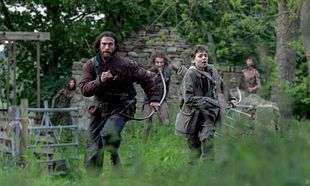A leisurely drive through '60s Hollywood, 'Once Upon A Time...' may take some detours here and there, but that's half the fun of it...
Hollywood, 1969. Rick Dalton (Leonardo DiCaprio) is a fading TV actor who's offered a chance to travel to Italy to make spaghetti westerns with his stunt double, Cliff Booth (Brad Pitt) and begin a new phase of his career. Meanwhile, rising star Sharon Tate (Margot Robbie) has moved into the house next to Dalton and is enjoying the parties and the nightlife that Hollywood has to offer...
'Once Upon A Time... In Hollywood' is as indulgent as anything Quentin Tarantino has done in years, but not for its length or its self-congratulatory tone. It's indulgent because Tarantino can fully realise the romanticised, glinting version of Hollywood that he has so often idolised in his work. The movie's run time allows for extended scenes of Tarantino running the lens over the sumptuous production design and the period detailing, or purposefully blares some obscure pop track of the era simply because he likes it, and he thinks it's cool.
Compared to 'Kill Bill', 'Inglorious Basterds' or any of his work post-'Jackie Brown', 'Once Upon A Time...' is one step removed from reality. The sun's always shining, and the colours are rich and vibrant. When we do see some of the squalor or the darkness underneath the surface, it's localised to the ever-present hippies who hitch their way up and down Sunset Boulevard, or the infamous Spahn's Movie Ranch. That said, it's not like 'Entourage' where it's vapid wish-fulfillment and soulless pleasures.
Leonardo DiCaprio gives one of his most vulnerable performances as the neurotic, bug-eyed Rick Dalton. Constantly questioning himself, drinking to excess, consumed with his fears, DiCaprio gives a bold testimony of the life of an actor who's self-worth is so fully wrapped up in his work. Compare that with Pitt's languid, easy-going stunt double, and you've got a dynamic that works beautifully in showcasing a relationship that feels lived in. Sure, it's slanted and weird, and you're never quite sure what's actually going on with them, but it's warm and genuine - and provides the emotional core of the movie.
Much has been said and written about Margot Robbie's role as Sharon Tate, and how little dialogue she has in the movie. Yet, at no point throughout are you not aware of her presence in the mixture, nor is it ever exploitative. For Tarantino, Tate's exuberance and naivete is in stark contrast to Dalton's bleary-eyed agonising, and we're seeing the Hollywood experience on the way up and the way down. Tate's scenes are joyful, marked with music and dancing, laughter and smiles. There's a touching moment where she goes in to see her own movie, 'The Wrecking Crew', and laughs along with the crowd at her own performance. By contrast, Dalton shares a scene with a precocious child actor, wherein the stark realities of the cyclical nature of Hollywood bursts out of him in tears.
Again, you're never not aware of Robbie's performance as Tate, as she's a constant presence - and that she's able to do all that with less dialogue is a testament more to her acting abilities than anything else. There's an aimlessness to 'Once Upon A Time...', as it meanders in and out of Playboy Mansion parties with distracting sidebars with Steve McQueen, or Mama Cass twirling through a scene. Charles Manson turns up in one scene, and is never seen again. Bruce Lee, played wonderfully by Mike Moh, has one key scene and then doesn't really crop up again in the story. It's a great scene, and features some thrilling choreography, but it doesn't move the story along in any kind of meaningful way. Rather, it gives us a real sense of the characters and that's often the reason why Tarantino's movies work so well. We remember the characters much more than we do the story, and 'Once Upon A Time...' is a movie of characters.
When compared to Tarantino's previous movies, the nature and the structure of 'Once Upon A Time...' lends itself more to comparisons with 'Jackie Brown' or 'Pulp Fiction' - not just for its sense of a heightened reality, but in how it feels more enjoyable to be around these characters and to live in the world Tarantino's created. It's in the movie's dying moments, however, that it divorces itself from reality and goes off into another dimension that's hard to discuss without spoiling - all of it soundtracked to the pleading, wailing tones of Vanilla Fudge's 1967 psychedelic rock hit, 'You Keep Me Hangin' On'.
No doubt the biggest complaint people will have about 'Once Upon A Time...' is the ending - or the considerable runtime - but you're getting your money's worth for it all. DiCaprio, Pitt, Robbie - they're firing on all cylinders, giving some of their best work in years. Tarantino's deep and abiding love for both the era and the Hollywood industry itself shines through in a way that few directors are able to do without seeming overtly self-congratulatory or self-deprecating. The music, the production design, the ripples of black humour through it, it's all there and it's hard not to be carried along with it.
A leisurely drive through '60s Hollywood, 'Once Upon A Time...' may take some detours here and there, but that's half the fun of it.



















































































